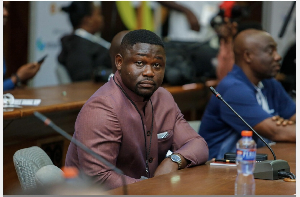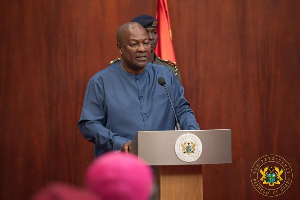His Excellency John Agyekum Kufuor,
President of the Republic of Ghana,
DEAR Mr President,
Thank you very much for your letter of October 21, 2002 to the Managing Director who has asked me to reply on his behalf as he is travelling and the proposals contained in this letter are time-sensitive. Our delay in responding reflects the very careful and serious consideration we have given to the various points raised in your letter. Let me reiterate at the outset, Mr President our strong desire to see Ghana achieve lasting economic success, and for the IMF to do all it can to help realize that goal.
Since your administration came to office, the IMF has given full support to your efforts to stabilize the economy and create the conditions for faster growth and poverty reduction, including thorough augmentation of our financial support, accelerating the decision point under the enhanced HIPC initiative and providing extensive policy advice and technical assistance.
Your government for its part took decisive measures on energy and utility pricing, developed a strong budget for 2001 and gave the Bank of Ghana the independence it needed to begin bringing down inflation and stabilizing the currency. The 2002 programme sought to consolidate those initial gains, with a budget that would strengthen Ghana's tax base and allocate resources (including HIPC relief) toward priority areas identified in the Ghana Poverty Reduction Strategy (GPRS), while reducing significantly the burden of domestic debt. The programme emphasized improved public expenditure management, so as to ensure that the budget was implemented as envisaged, further pricing reforms that would put the finances of key public enterprises on a sustainable footing, launching of the divestiture strategy, and continued progress on disinflation.
While notable advances were made last year, several of these key objectives of the PRGF-supported programme have not been fully realized. Indeed, it is our assessment that the policy slippages this year put at risk the core goals of the government's economic strategy. First, budget execution has departed substantially from the approved budget underlying the programme. Weaknesses in expenditure management ? especially control over the wage bill ? which began in late 2001 and worsened in 2002, are the main cause of the additional domestic government borrowing this year.
Second, the automatic adjustment formula for petroleum prices ? a cornerstone of the programme ? has been overridden, and pump prices kept fixed even as world oil prices rose and the cedi depreciated. As a result, the oil refinery is set to accumulate new debt during 2002 estimated around 2 per cent of GDP, which the government will likely have to take over and service against this background, we are very much encouraged by your stated intent to liberalize the oil sector by the end of the year, we hope this would include the abolition of administered pricing, which would provide helpful protection for Ghana's public finances in the future.
Third, as a result of these and other policy deviations ? including delays in the VAT increase, divestiture and utility price adjustments ? the staff estimate that the stock of government domestic debt (including the oil refinery's bank overdraft) may exceed the end 2002 programme target by almost 9? per cent of GDP. You will agree that this is a major departure from programme objectives, and the servicing of this debt will severely constrain the government's ability to fund the spending priorities outlined in the GPRS.
A further important issue has arisen in relation to the implications of the loan your government is negotiating with the International Financial Consortium ("IFC"). Given the scale and unusual character of this loan, it's of great concern that the government has so far not shared with IMF and World Bank staff the detailed information (on the sources of fund the terms and conditions, end the modalities for managing the funds) needed to assess its potential impact on Ghana's IMF-supported programme. Prior consultation on this issue will preclude the possibility of problems emerging later which could seriously affect the resumption of financial assistance from the IMF as well as donor support.
Under these circumstances, Mr President, there are two possible ways to take our collaboration forward, and we are ready to be guided by you as to which route to follow.
- The first option would be to seek an extension of the current PRGF arrangement (which would otherwise expire on November 30, 2002) for five months, to allow time for discussions on a policy programme for 2003 that would warrant completion of the final review under the arrangement. To support the request for the five-month extension, the authorities would need to demonstrate that initial steps have been taken to address the recent policy slippages and allay concerns with respect to the "IFC" loan, through the following measures:
- An increase in petroleum prices, bringing them into line with the automatic adjustment formula, together with an announcement those future adjustments would be made according to the formula without further official review authorization.
- A cabinet decision that, for 2003, the quarterly expenditure ceilings on personnel emoluments (Item 1) will be vigorously enforced by the Ministry of Finance.
- Abolition of the direct debit system for executing expenditures.
- A cabinet decision imposing a moratorium on further wage increases for public servants in 2002.
- Confirmation that a transactions adviser has been appointed (with signed contract) for the divestiture of Ghana Commercial Bank.
- Full disclosure to the IMF and World Bank regarding the "IFC loan", including the sources of funding, the terms and conditions and the arrangements for managing the loan financed expenditures.
If we receive confirmation by December 6 that the above measures have been taken, the Executive Board would then be asked to grant a further extensions of the arrangement to May 1, 2003, as well as the implementation of prior actions that are agreed upon in the course of the discussions.
In this context, we greatly appreciate your clear statement that the envisaged VAT increase will be a part of the 2003 budget package. If your government were to decide not to proceed as outlined above the alternative is to allow the current arrangements to expire on November 30 without completion of the final review and to begin work promptly on a programme to be supported under a new PRGF arrangement.
The time frame for an Executive Board decision on the resumption of disbursements to Ghana would be the same under this option as under the first. Namely, subject to successful conclusion of the programme discussions and implementation of any agreed prior actions, the proposal for a new arrangement could be brought to the Executive Board following passage of the 2003 budget.
We would welcome the early response of your government regarding which option they wish to pursue, so that our staff can begin the necessary work as quickly as possible. Under either option, if it is agreeable to the authorities, a staff mission is ready to travel to Accra for programme discussions as soon as practicable. Mr President, I thank you again for your helpful letter, and stress the commitment of Fund Management and staff to continue our close co-operation with Ghana.
Very truly yours
Anne Kruger,
Deputy Managing Director.












